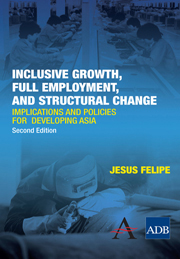 Inclusive Growth, Full Employment, and Structural Change
Inclusive Growth, Full Employment, and Structural Change Book contents
- Frontmatter
- Contents
- Illustrations
- Abbreviations
- Foreword
- Preface and Acknowledgments
- Executive Summary
- Chapter 1 What Is Inclusive Growth?
- Chapter 2 What Is the Main Constraint that Developing Countries Face?
- Chapter 3 Why Full Employment and Who Should Be Responsible for Trying to Achieve It?
- Chapter 4 Why Is Growth Unstable?
- Chapter 5 What Is the Role of Agriculture in the Process of Structural Change and in Delivering Full Employment? Full Employment I
- Chapter 6 What Is the Role of Investment in Delivering Full Employment? Full Employment II
- Chapter 7 Why Is “Planning Development” Necessary?
- Chapter 8 What Is Industrial Policy? Full Employment III
- Chapter 9 Structural Transformation, Industrialization, and Technological Change in Developing Asia: What Does the Empirical Evidence Show?
- Chapter 10 Why Do Export Diversification and Sophistication Matter?
- Chapter 11 Unemployment Versus Inflation: Which One Should Be the Public Enemy Number One?
- Chapter 12 What Should Be the Role of Fiscal and Monetary Policies for Development? Full Employment IV
- Chapter 13 Is It Possible to Achieve Full Employment in the Presence of Structural Transformation?
- Chapter 14 Should the Government (Public Sector) Intervene Directly and Become the Employer of Last Resort? Full Employment V
- Chapter 15 Can Competitiveness and Globalization Deliver Inclusiveness and Full Employment?
- Chapter 16 Export-Led Growth or Domestic Demand–Led Growth?
- Chapter 17 Is Education a Key Ingredient of Inclusive Growth?
- Chapter 18 Conclusions: How Can Developing Countries Implement an Inclusive-Growth and Full-Employment Strategy?
- References
- Author Index
- Subject Index
Chapter 14 - Should the Government (Public Sector) Intervene Directly and Become the Employer of Last Resort? Full Employment V
- Frontmatter
- Contents
- Illustrations
- Abbreviations
- Foreword
- Preface and Acknowledgments
- Executive Summary
- Chapter 1 What Is Inclusive Growth?
- Chapter 2 What Is the Main Constraint that Developing Countries Face?
- Chapter 3 Why Full Employment and Who Should Be Responsible for Trying to Achieve It?
- Chapter 4 Why Is Growth Unstable?
- Chapter 5 What Is the Role of Agriculture in the Process of Structural Change and in Delivering Full Employment? Full Employment I
- Chapter 6 What Is the Role of Investment in Delivering Full Employment? Full Employment II
- Chapter 7 Why Is “Planning Development” Necessary?
- Chapter 8 What Is Industrial Policy? Full Employment III
- Chapter 9 Structural Transformation, Industrialization, and Technological Change in Developing Asia: What Does the Empirical Evidence Show?
- Chapter 10 Why Do Export Diversification and Sophistication Matter?
- Chapter 11 Unemployment Versus Inflation: Which One Should Be the Public Enemy Number One?
- Chapter 12 What Should Be the Role of Fiscal and Monetary Policies for Development? Full Employment IV
- Chapter 13 Is It Possible to Achieve Full Employment in the Presence of Structural Transformation?
- Chapter 14 Should the Government (Public Sector) Intervene Directly and Become the Employer of Last Resort? Full Employment V
- Chapter 15 Can Competitiveness and Globalization Deliver Inclusiveness and Full Employment?
- Chapter 16 Export-Led Growth or Domestic Demand–Led Growth?
- Chapter 17 Is Education a Key Ingredient of Inclusive Growth?
- Chapter 18 Conclusions: How Can Developing Countries Implement an Inclusive-Growth and Full-Employment Strategy?
- References
- Author Index
- Subject Index
Summary
The Conservative belief that there is some law of nature which prevents men from being employed, that it is “rash” to employ men, and that it is financially “sound” to maintain a tenth of the population in idleness for an indefinite period, is crazily improbable—the sort of thing which no man could believe who had not had his head fuddled with nonsense for years and years. … Our main task, therefore, will be to confirm the reader's instinct that what seems sensible is sensible, and what seems nonsense is nonsense. We shall try to show that … to set unemployed men to work on useful tasks does what it appears to do, namely, increases the national wealth.
—John Maynard Keynes (1972, 90–92)Given that it is very difficult for the market to achieve full employment due to the political and technical problems discussed in chapters 4, 6, and 13, and assuming national policies have shifted toward the achievement of full employment, one could ask if governments in developing countries could and should act as employers of last resort and contribute to this objective directly. Suppose, for example, that due to the use of efficiency wages (Stiglitz 1976), during downturns firms lay off the least skilled workers. What can society do? As noted in chapter 11, William Vickrey (1996) proposed a program of “savings-recycling public employment” to achieve full employment.
- Type
- Chapter
- Information
- Inclusive Growth, Full Employment, and Structural ChangeImplications and Policies for Developing Asia, pp. 231 - 234Publisher: Anthem PressPrint publication year: 2010


